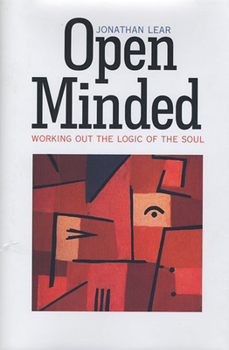Open Minded: Working Out the Logic of the Soul
Select Format
Select Condition 
Book Overview
Freud is discredited, so we don't have to think about the darker strains of unconscious motivation anymore. We know what moves our political leaders, so we don't have to look too closely at their thinking either. In fact, everywhere we look in contemporary culture, knowingness has taken the place of thought. This book is a spirited assault on that deadening trend, especially as it affects our deepest attempts to understand the human psyche--in philosophy...
Format:Paperback
Language:English
ISBN:0674455347
ISBN13:9780674455344
Release Date:September 1999
Publisher:Harvard University Press
Length:356 Pages
Weight:2.20 lbs.
Dimensions:0.9" x 6.0" x 9.1"
Customer Reviews
4 ratings
very interesting
Published by Thriftbooks.com User , 22 years ago
I picked this book out at a local Borders, in the philosophy section. I wasn't anticipating the copious amounts of psychology, but it was still a good solid read.
I reread this book and I learn more each time.
Published by Thriftbooks.com User , 24 years ago
Patricia, whose computer I am using, is my friend. She loaned me your book and I want to tell many people that it is beatifully written and full of wisdom. I came to the USA from Vietnam in 1977 with very little knowledge about philosophy or psychology. Since then I have learned about American and European ideas.My brother, who came here with my mother and my sister and me, was very ill. We found him a doctor who practiced psychology like Dr. Freud. After many years, he became healthy and a father. He explained to us the ideas in your book long before I read it but I did not understand them. He worked very hard to live his life well he said. Now, after studying your book, I think I understand pretty well what he meant. I am happy that you can write well about such ideas. Bless you and Dr. Freud and Plato. We owe our happiness to people like you. Probably many do.
Lear is asking us to think -- nothing more.
Published by Thriftbooks.com User , 25 years ago
Many take issue with Lear's "defense" of Freud, but I see it differently. Lear is not so much defending Freud as he is using the example of Freud-bashing to remind us to continue to question what we think we know about reality. The human tendency is to look for answers, and that is good for us as a species. In our search for order, patterns, and understanding we have learned a great deal about the nature of objective reality (the natural world)...but the basis of scientific pursuit is test and test again; question and question again. There are scientists who continue to refine the measurement of Pi...we don't reach a point where we can simply assume that we know, and we can't interpret the work of Philosophers or Scientists with shallow prejudice and expect to come up with a true understanding of their contributions. Freud's writings are complex and convey a great deal. Many of his ideas were false ones, but that doesn't negate the value of the work he pursued. It doesn't erradicate the value of the questions he asked or the paths he suggested (either through his error or his truth) to others. The most important aspect of Lear's work; the most profound insight in all of his varied writings comes down to this: If we want to believe we are right, that we know what is what, then we need not question, think, integrate, or work intimately with complexity. However, if what we care about is the truth; if what we are relentlessly and endlessly pursuing is a scientific, integrated understanding of reality; we must think hard, question everything, and integrate endlessly and joyously -- embracing this, our human challenge.As Tom Stoppard wrote in _Arcadia_, "It's wanting to know that makes us matter. Otherwise we're going out the same way we came in."
Lear's Magnum Opus! Buy This Book!
Published by Thriftbooks.com User , 26 years ago
Like "Love and Its Place In Nature," most of this book is a philosophical interpretation of Freudian psychoanalysis. But it is more. One chapter is a discussion of the purpose of tragedy (why would anyone want to watch, or read, or even write a tragedy?). The answer is in this book. Another chapter that has very little to do with Freud discusses the tension between the transcendental nature of Philosophy and the brute classifications of "scientific" Anthropology. Is there room for a merging of the two? Lear thinks so. But the hook is in the first chapter, where he launches a full-on aussault on "knowingness." For example we all "know" Clinton committed infidelity and thus we choose to brush it aside or blow it up into some outrageous impeachment crusade. But how do we really "know" what to do? Read Lear's book and you will be surprised, I guarantee you that.





